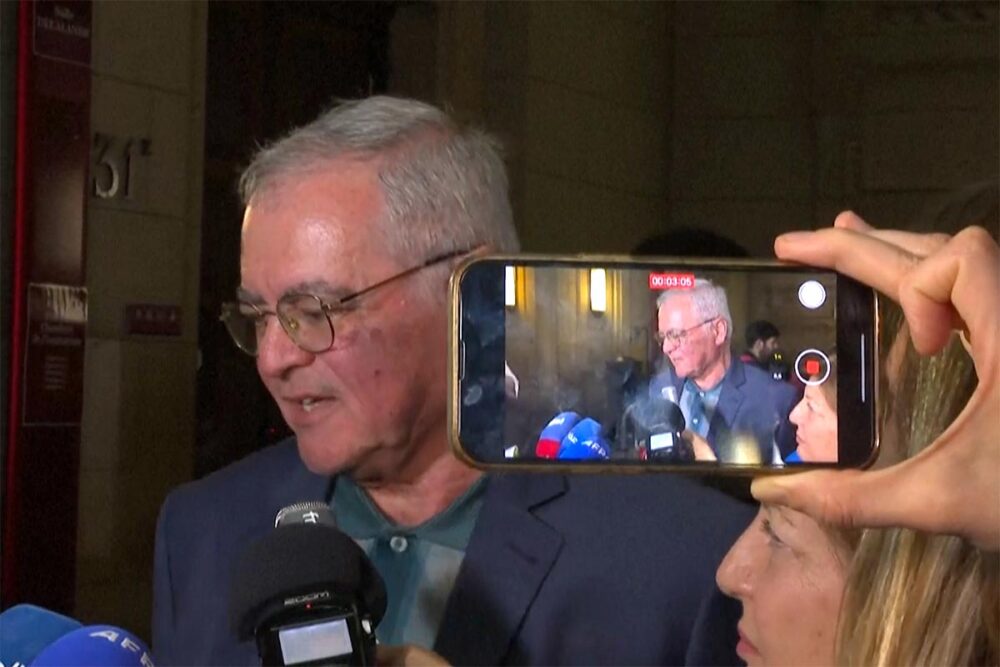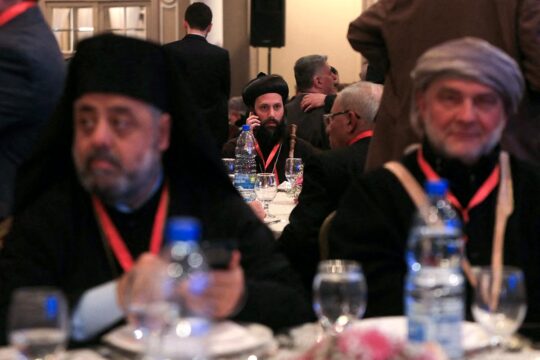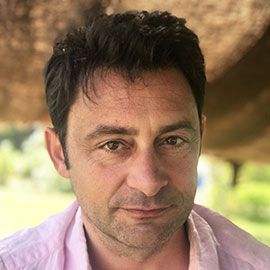During the civil parties’ and public prosecutor’s closing arguments on May 24, and when hearing reactions to the guilty verdict that the Paris Assize Court handed down a few hours later, two questions hovered beneath the high ceilings of the historic Palais de Justice. The first concerns the lack of adversarial debate in a trial where the defence was absent and investigators were unable to visit the scene. The second is the impact of such a conviction on the Syrians present at the trial, and what they have to say about it.
On that day, Ali Mamlouk, Jamil Hassan and Abdel Salam Mahmoud, three heads of military intelligence for Bashar al-Assad’s regime, were found guilty of the arrest and death of French-Syrian father and son Mazen and Patrick Dabbagh and expropriation of their property. The three were sentenced to life imprisonment. These acts were qualified as complicity in crimes against humanity and war crimes. The sentence was handed down after four days of hearings and the testimony of 11 witnesses, none of whom were eyewitnesses to the events that befell the victims. Issuance of the reasoning for the verdict was postponed “due to the complexity of the case”, according to court president Laurent Raviot.
A barrier against “normalization” with Syria?
At the end of the hearing Obeida Dabbagh, brother and uncle of the two disappeared who brought this case to justice and fought for the truth for over ten years, spoke in short, emotional sentences before the cameras of French and Arab television channels. “It was the first Assize Court of my life,” he said. “It was nerve-wracking, but everything turned out for the best in the end. I’d like to thank the judges for their decision. I didn’t expect anything more. For me, it is absolute happiness. For Mazen and Patrick, I tried to do my utmost. For them, posthumously, it’s also a victory.”
Standing back from the cameras, Syrian lawyer Mazen Darwish, who was at the trial and whose Syrian Centre for Media and Freedom of Expression (SCM) participates in numerous trials in Europe, also expressed his satisfaction, despite some “complicated emotions”. “I feel sorry that this did not take place in Syria. I feel sorry that this is mostly symbolic,” he told Justice Info. He went on to explain why, despite everything, this trial in absentia “means a lot to the Syrian community”, some of whose members had come from Germany and elsewhere in Europe to attend. “It’s a message for the victims, for the authorities, that Syria needs justice, not revenge. But it’s also a message for the refugees. I’m one of them. I came back from death, but I also want to go back to my country,” he said. This verdict is important, Darwish explains, for all Syrian refugees worried about being sent home if Paris or Berlin “normalizes” relations with the Assad regime. For them, he says, it represents a barrier against the temptation of diplomats to “give killers a second chance”.
“This is a fantastic first step in France towards judicial recognition that Bashar al-Assad’s regime is a criminal one. It’s a signal to our leaders,” agrees Clémence Bectarte, lead lawyer for the civil parties, who has been supporting Obeida Dabbagh and his wife Hanane since 2016. “Yes, it is a symbolic trial, because tomorrow the convicts won’t be sleeping in prison. But we know very well that international justice takes time. All the efforts made can be used for other cases," she says. “Since the creation of the Pôle [a judicial unit specialized in punishing crimes against humanity], this is the first time we’ve tried a case where we couldn’t go and investigate in the field. Twenty-three people testified in these proceedings, some of them afraid. I’m not denying the difficulties, but if there were only three survivors at the trial, it’s because we had to make choices. We only had four days.”
Fear among the witnesses
“I’m not used to pleading in front of an empty stand,” lamented Céline Viguier, the public prosecutor, as she began her closing address. The public prosecutor’s office, she explained, had done everything in its power to ensure that the defendants were informed of the trial opening and the possibility of presenting a defence. This was done through informal channels -- notably the Arabic-language media and Syria’s Permanent Mission to the United Nations in Geneva --, due to the breakdown in diplomatic relations between Paris and Damascus. One of the accused had, according to several testimonies, occupied the Dabbagh family home in Damascus, so a summons was sent to that address “by registered letter”, she said. How, then, could the powerful Syrian intelligence services, of which the defendants are members, have been unaware of this trial? In fact, they chose to ignore it, not to appoint lawyers, and “this is a hearing that in no way infringes their rights”, she concluded.
“The acts committed are part of a context that tens of thousands of Syrians can recognize,” said the prosecutor. She nevertheless referred previously to the investigating judges’ difficulties in questioning the three direct witnesses to the arrest of Patrick and Mazen Dabbagh on November 3 and 4, 2013, at their Damascus home. Mazen’s wife and daughter, Haifa and Raya, who subsequently took refuge in France, declined the investigating judges’ summons on three occasions. Only one telephone exchange took place with the daughter. They “feared for their safety”, it says in the indictment. Wissam Naser, Mazen’s brother-in-law who was arrested with him, was the one who told the story of how they were taken to Mezzeh prison and found Patrick, who had been arrested the day before. But his account was reported by Obeida; the examining magistrates were unable to question the brother-in-law, who is said to have remained in the country and still works for a powerful businessman close to the regime. Another witness could not be heard by the examining magistrates. This was a young man, also incarcerated in Mezzeh, who told the SCM that he had seen Patrick Dabbagh in this detention centre “towards the end of 2013”.
“The fear of reprisals doesn’t stop with exile,” explains Darwish, who reported this testimony to the magistrates.
Material evidence
The indirect testimonies have, however, been supplemented by documents. Obeida obtained them thanks to proceedings he initiated with a lawyer in Syria to contest the expropriation of the family home - effective as of July 2016. He first received two death certificates, issued in August 2018 by the Syrian Interior Ministry, which do not specify the place or cause of death. Only dates of death are indicated. Then a judgment was transmitted to him, pronounced against his brother in January 2014 by a court of exception, which ordered the transfer of his assets to the Syrian state. And finally, still thanks to this procedure, a rental contract for the house drawn up for the benefit of the air force intelligence service, for around 30 euros a year. This document corroborates the testimony of the family home’s neighbours, who had informed Obeida that the house was occupied by a certain Abdel Salam Mahmoud, director of the investigation branch of the air force intelligence service, which controls the Mezzeh prison.
In its 16-page reasoning released on May 30, the Paris Assize Court recalls that Patrick “was 20 years old at the time of his arrest, that he was in perfect physical health, and that he died less than three months after his arrest”, according to the official date of his death. “Under these conditions, this short period of time and the elements of context allow us to conclude that he was the victim of violence and torture that caused his death.” As for his father Mazen, who officially died after four years’ in prison, “the cause of his death is necessarily related to his detention, even if the court has no precise elements as to the nature and severity of the ill-treatment or torture suffered”.
A concerted plan
The court found that these acts were committed “in execution of a concerted plan”, which was “decided at the highest level of the State and implemented at all levels of the administrative and military chain, (...) by meticulously listing the deceased victims (numbering and taking photographs), organizing the disappearance of bodies in mass graves, and systematizing the use of torture leading to mass murder”. The number of civilian victims of this policy – “more than 100,000 disappeared according to several concurring estimates” - and the use of photographs from the so-called Caesar files by a UN-commissioned investigative team make it possible, say the judges, “to illustrate the widespread and systematic nature of this attack”, constituting a crime against humanity.
For the war crime, the court referred to the conclusions of the International Commission of Inquiry on Syria, which “allow us to consider that the clashes between the regime and various opposition forces (from March 2011) gradually turned into a generalized and continuous confrontation” in early 2012. Consequently, the State’s appropriation of the Dabbagh house “can be legally analysed as extortion, insofar as the procedure (...) had the sole aim of confiscating and appropriating the property of a person who cannot be considered a belligerent” and so constituting a war crime (“délit de guerre”) under French law.
Bashar el-Assad’s immunity
In a formulation unlikely to be endorsed by all, the court starts by saying that Bashar al-Assad --at the top of the chain of responsibility – “enjoys the immunity recognized by the international community for any Head of State”, but that “this is not the case for the three accused”. “The Court considers that crimes against humanity, deemed the most serious in the hierarchy of crimes, cannot be covered” by the immunity “also granted by international law to any public official for acts performed within the scope of his functions”.
The judges confirmed “in the first place the criminal responsibility of Ali Mamlouk”, who was then head of the National Security Office, “the supreme hierarchical authority of all Syrian intelligence services”. Secondly, the judges held “Jamil Hassan”, at the time head of the Air Force intelligence service, criminally liable. “He was the recipient of daily reports from his services and was described as being particularly present at the Mezzeh airport site”. And finally, they pronounced the criminal liability of Abdel Salam Mahmoud, who “took possession of [Mazen Dabbagh’s] home in July 2016, after his service had evicted the rightful occupants”.
Lastly, the court ruled that the three convicts should receive identical sentences, “even if their involvement was at different levels in the chain of command”. The arrest warrants issued against them on March 29, 2023 remain in force. As indicated by the court president at the start of hearings, the “default” procedure means that if the three Syrians are arrested they will be retried.








